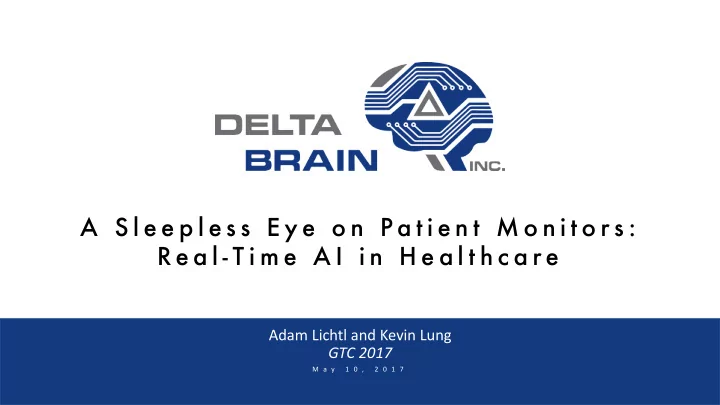

A S l e e p l e s s E y e o n P a t i e n t M o n i t o r s : SMARTER SOFTWARE for better care R e a l - T i m e A I i n H e a l t h c a r e Adam Lichtl and Kevin Lung GTC 2017 M a y 1 0 , 2 0 1 7
AI in Healthcare: Barriers to Widespread Deployment 1. Talking about innovation, without investing in it. 2
AI in Healthcare: Barriers to Widespread Deployment 1. Talking about innovation, without investing in it. 3
AI in Healthcare: Barriers to Widespread Deployment 1. Talking about innovation, without investing in it. 2. Hoarding data. 4
AI in Healthcare: Barriers to Widespread Deployment 1. Talking about innovation, without investing in it. 2. Hoarding data. 3. Attempting to build it in-house. 5
AI in Healthcare: Barriers to Widespread Deployment 1. Talking about innovation, without investing in it. 2. Hoarding data. 3. Attempting to build it in-house. 4. Measuring the wrong things. 6
Good Machine Learning Leads to Better Clinical Care • Inter-observer variability • Consistent (qualitative, objective) • Intra-observer variability • Accurate (fatigue, bias resistant) • Intermittent check-ins • Continuous flow of information Machine learning has barely scratched the surface in healthcare. Example: Breast cancer… or not? machine learning is • Pathologists agree only 75.3% of the time! revolutionizing Radiologists miss 16% of breast cancer diagnoses • digital pathology. 7
Beyond Static: Decision Support on Time Series Data • Interpretation of real-time physiological data drives split-second life-altering clinical decisions. • Reliably identifying key features requires years of experience in addition to advanced medical training. • But the process is still: − Slow, − Error-prone, and − Inconsistent across individuals. • Quality of care depends too strongly on the experience of the person monitoring the data. 8
Where Can Timely and Accurate Interpretation Save Lives? • Environments where: −Every second matters −Adverse outcomes are severe −Interventions are costly • Require interpretations that are: −Faster −More accurate −Consistent • Delta Brain’s technology supports decision making speed, quality, and scale. 9
AI-Based Patient Monitoring: Near-Term Vision • Accurate, consistent and real-time detection of events and trends in patient condition. • Continuous 24/7 coverage for all patients, local and remote. • Adaptive technology that gets smarter with each use. 10
Beyond Accuracy and Throughput, to Scale 11
GPU-Based ML in a Highly-Regulated Industry 12
AI-Based Patient Monitoring: Long-Term Vision Integrate within and between hospital systems • Data: increase statistics on rare cases • Triage: identify high-risk patients and move them to the appropriate facilities • Evidence-Based Protocols: “Fleet learning” across hospitals, to distribute best practices. 13
AI in Healthcare: Hope for Widespread Deployment • This is already a trend in other industries • Some health systems are stepping up, such as the 100+ members of the Solutions for Patient Safety • “Putting aside competition” • “Learn from and all teach each other” 14
AI in Healthcare: Hope for Widespread Deployment • This is already a trend in other industries • Some health systems are stepping up, such as the 100+ members of the Solutions for Patient Safety • “Putting aside competition” • “Learn from and all teach each other” 15
Smarter Software for Better Care Want to learn more? Want to be a clinical partner? CONTACT US: info@delta-brain.com or partners@delta-brain.com 16 16
Recommend
More recommend